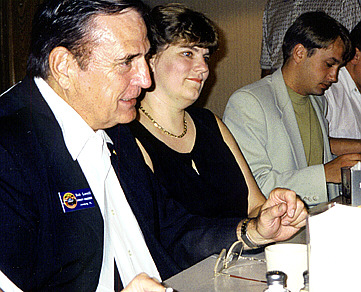![]()
General Board of Global
Ministries
![]()
UM Information
![]()
UM Reporter
![]()
![]()
Favorite Places
![]()
![]() Florida Southern College
Florida Southern College
![]()
![]() Bethune Cookman College
Bethune Cookman College
![]()
![]() FL
UM Children's Home
FL
UM Children's Home
|
|
Russians, Americans find common ground in religious experience |
|
Photo by Ivan Corbin |
Leesburg Mayor Bob Lovell, left, and his daughter answer questions about the American political process and structure at the local level from five Russians visiting the Leesburg District as part of the “Open World” Russian Leadership Exchange program. The group toured City Hall, visited with the city council and received copies of the city’s 2000 budget from Lovell. |
| By Michael WachtFRUITLAND PARK — Despite growing up on opposite sides of the world
geographically and politically, the Rev. Ivan Corbin, pastor of Community United Methodist
Church here, found he could share a common religious experience with a group of Russians
that visited the Leesburg district Aug. 19-28 as part of the "Open World"
Russian Leadership Exchange.
The Corbin family was one of three from the Leesburg District that served as hosts last month to seven Russian visitors who were part of the leadership exchange. The program was designed by the United States Library of Congress to give 3,000 current and future Russian political leaders the chance to gain firsthand knowledge of a republican government and free-market economy. While visiting the Community church, one woman asked Corbin why Protestant churches use an empty cross instead of the crucifix used by the Russian Orthodox Church, he said. That question prompted a discussion about the importance Protestant Christians place on the risen and living Jesus Christ and the symbolism in the cross and flame logo used by the United Methodist Church. Corbin said he explained that the flame represents the Holy Spirit and was symbolic of John Wesley’s heartwarming experience. "She told me, ‘When we held hands at the end of the worship service, that’s what my heart felt, warm,’ " he said. "It shows that John Wesley’s heartwarming experience can be a universal thing." The group’s five men and two women were from diverse backgrounds and locations, Corbin said, including teachers, business people, students and a scientific librarian. One lives in Moscow, another in Siberia and a third in Vladivostok, which is eleven time zones away from the Russian capitol. "One girl is from a town in Russia that was a secret town," Corbin said. "It was one of 10 cities whose purpose was to develop nuclear weapons." Because of the secret nature of the work being done there, the town’s residents had no contact with the outside world. Now, with the decline of the nuclear weapons industry in Russia, 56,000 people are looking for work. "Nobody in Russia knew about these people," Corbin said. "…nobody knows them, and nobody wants to help them." A day spent at an elementary, middle, high and vocational school gave the Russian visitors insight into the educational system in the United States. That activity was of particular interest to one of the women who helps people in her community get vocational training and find new jobs, according to Corbin. Corbin said the time spent in the United States touched the Russians spiritually, socially and culturally. "It was worth it to know that these people took ideas back home," he said. "…ideas they may be able to use in their jobs or in public office and be able to help their country." Top
of this page |

